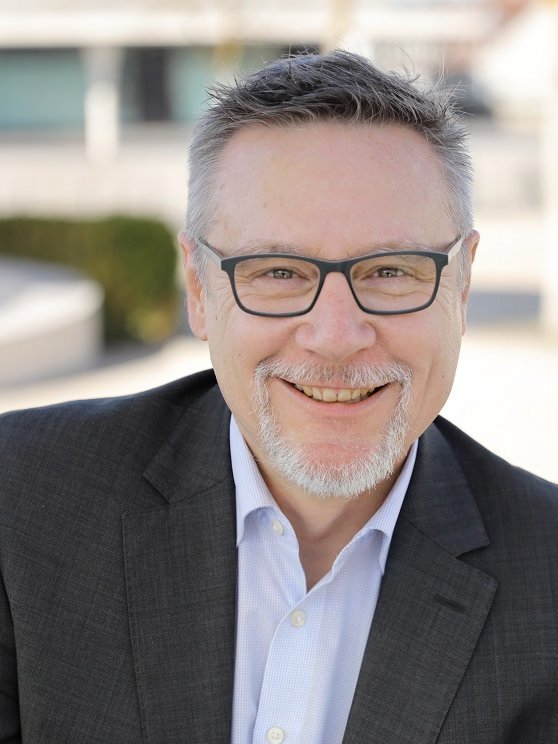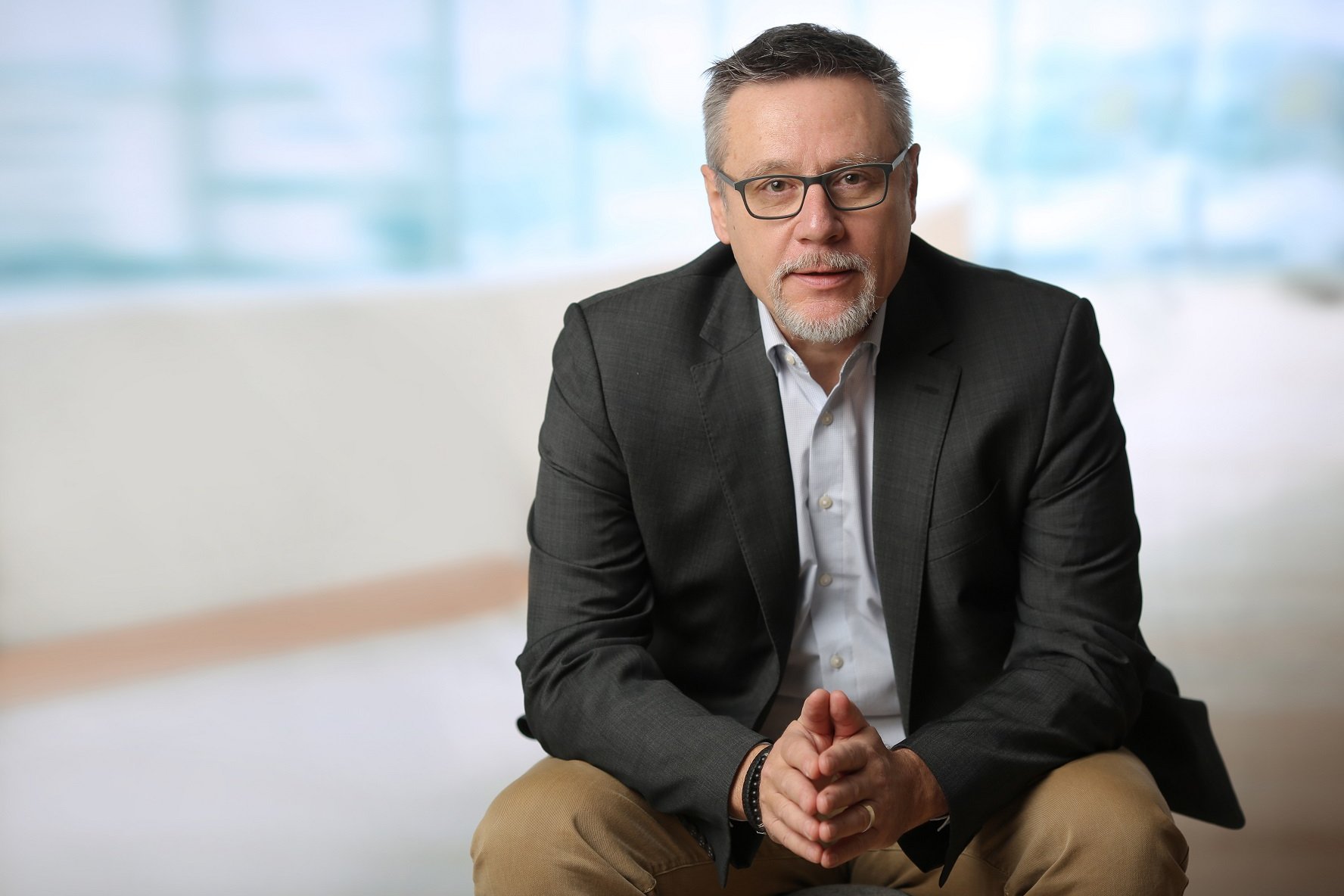"I've seen it all"
Change is a constant in the life of Dirk Aßmann-Staudt. The Darmstadt University of Applied Sciences alumnus has founded and sold multiple IT companies. With some he was successful, with others he failed. The computer science graduate has been self-employed, he has been employed in management positions and has also experienced unemployment, too. These are all facets of a professional life earned and experience gained that he uses today as a book author and applies in his work as a career coach. The 59-year-old has found a work concept for himself that is fulfilling.
 Portrait photo Dirk Aßmann-Staudt
Portrait photo Dirk Aßmann-Staudt
Restless, that's how Dirk Aßmann-Staudt describes himself. He has moved twenty times in his life, living in Mannheim, Darmstadt and the Black Forest. Since last fall, he has been living in Bensheim on the Bergstrasse in southern Hesse. “I travel light,” he says. The h_da alumnus has consistently cast off material ballast over the past few years, always sorting out his belongings and reducing down to the bare essentials. This gives him a sense of freedom and independence, also because he can change locations at any time. He has cut his working hours down to four days a week. Since 2018, Dirk Aßmann-Staudt has returned to self-employment. “New Work” is his credo - a work concept that is currently in high demand, combining professional development with personal fulfillment. “I can manage my own time. I can work when and where I want doing what pleases me. I've never been so happy and satisfied with my work,” he says, taking personal stock. Today, he says, he makes the system fit him instead of adapting himself to it. He doesn't like the term work-life balance, because it is still often the employer who sets the tone. Work-life blending, the mixing of life and work, appeals to him more.
Training as a family therapist
For the past four years, the 59-year-old computer scientist has been using his decades of professional experience to work as an employment, career and start-up coach. In cooperation with the German Federal Employment Agency, among others, Aßmann-Staudt advises job seekers or those who have a job but would like to change and perhaps strive for meaningful, sustainable work. "WandelWerk" is the name of the company the alumnus founded for this purpose. He advises people on what a "contemporary, results-based" job application should look like, helps with career planning or how to become self-employed with foresight and place a business idea. "I know the entire spectrum of the working world, all the aspects that count," says Aßmann-Staudt. From management structures in the industry to modern IT technology, media skills, trends and hybrid ways of working. He even went through training as a family therapist, which was helpful for himself then and for his consulting work today.
One target clientele for his coaching is the 50+ generation and what strategies they can use to meet the rapid pace of technological change and IT innovations. He is currently writing a book, which he plans to publish soon entitled “Five stages of professional personality development”. Aßmann-Staudt is also the owner of another company - the Darmstadt-based “nachVorne denken” - and deals with current hybrid work concepts, among other things. Together with his colleague Verena Pankoke, for example, he published a “Home-Office Compass” in 2020, a 70-page guide for a sustainable home office strategy.
 Portrait photo Dirk Aßmann-Staudt
Portrait photo Dirk Aßmann-Staudt
“My studies gave me a fundamental understanding”
His computer science studies, which he completed at Darmstadt University of Applied Sciences in 1992, were the foundation for his current entrepreneurship. IT technology and digitization are the tools of the trade for his daily work. “I'm grateful for the degree. It gave me a fundamental understanding. I know how a processor ticks, how things are connected in a network, how to write a program. I know the technology and also its problems. I still benefit from that today,” says Aßmann-Staudt.
The practical approach of the Darmstadt University of Applied Sciences “did him a lot of good” as a student, he recalls. After leaving school, he didn't quite know where to go, so at first he completed a banking apprenticeship, but quickly realized “that it wasn't for me.” He then studied four rather tedious semesters of business administration at Mannheim University, then switched to business informatics at Darmstadt Technical University, where he “survived four semesters,” he recounts. Above all, Aßmann-Staudt describes the very theoretical focus as enormously time-consuming and incompatible with running the small IT company he founded with two friends in 1985 while he was still a student. “A real basement startup,” he says - similar to the beginnings of garage startups that gave rise to such high-tech giants as Apple in the late 1970s. The friends programmed an ERP system for Apple computers, which were new at the time. ERP stands for Enterprise Resource Planning, software solutions that are used to plan a company's resources. It allows a variety of business applications and operational data to be integrated and processed in a central database.
Founded several companies
Parallel to his studies at Darmstadt University of Applied Sciences, Aßmann-Staudt worked in his start-up and developed databases for customers. Later, the friends sold the company and founded a new software company called “Connectivity Mannheim” after graduation. “We took advantage of the Internet boom in the 1990s.” The attack on the Twin Towers on Sept. 11, 2001, however, was a watershed. Some of its main customers included advertising agencies and marketing firms that ran into trouble after the attack and the crisis that followed. The software company had to downsize from 35 employees to four. “That took its toll on us,” Aßmann-Staudt recalls. He got out, sold his shares in the company. A new start-up didn't ignite as he had hoped. “Part of the learning journey is failure,” the alumnus says today. After that, however, he worked for other companies for 13 years in the IT industry as a department or division manager, sometimes responsible for up to 70 employees.
Because of impending burnout, he eventually quit and was out of work for several months. “I went through a lot of change.” And reinvented himself again and again. Today, Dirk Aßmann-Staudt describes himself as a relaxed self-employed person instead of a stressed-out employee. He already has new plans. For a few weeks, he would like to work from abroad – “maybe Italy or France,” he muses. A convenience of digitalization that no longer requires presence. And he will take part in a UN mission in the Middle East as an economic advisor. There, too, the course has already been set.
Author
Astrid Ludwig
March 2022